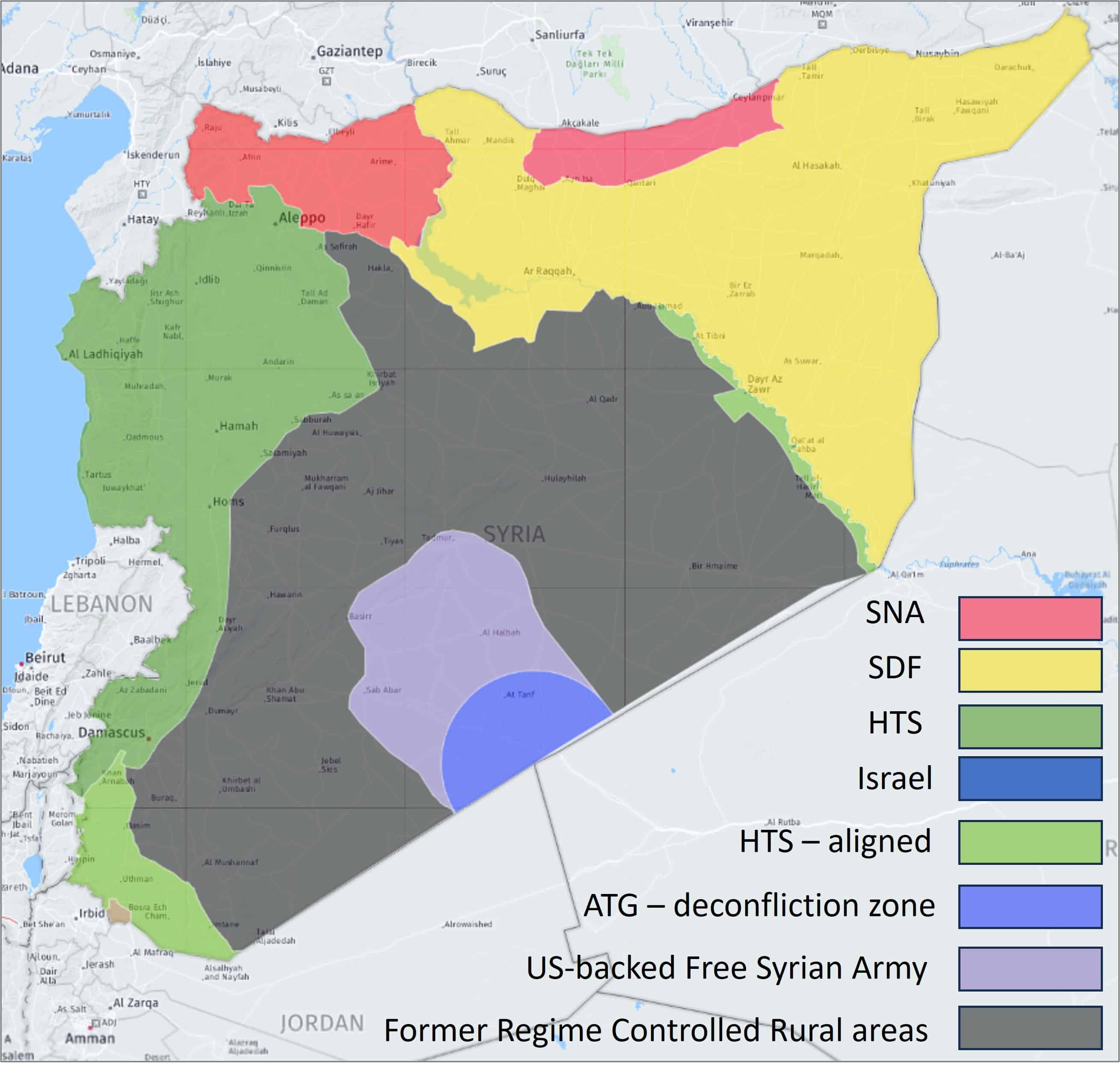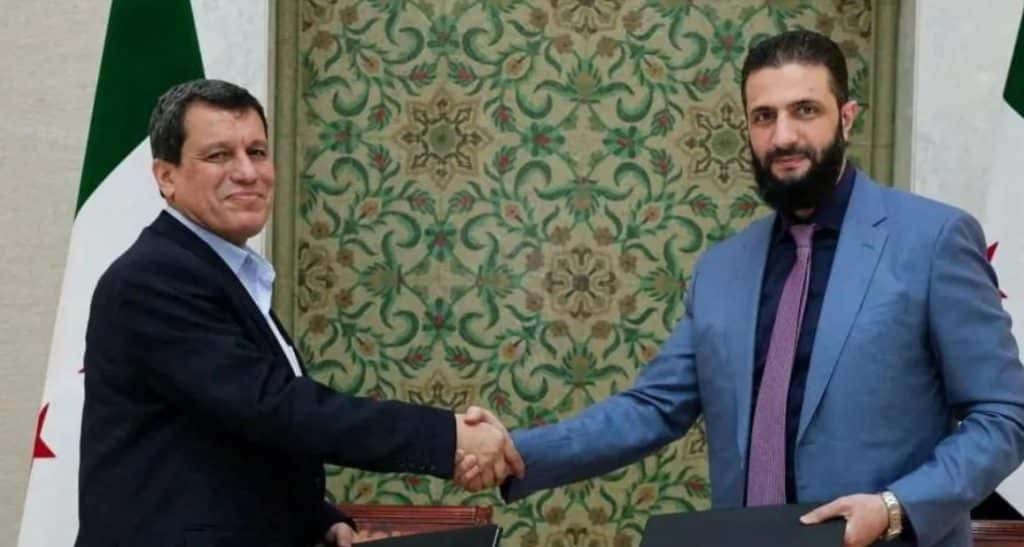NATIONAL OVERVIEW
Nationwide incidents
SIGNIFICANT EVENTS
- SDF and interim government sign breakthrough integration agreement
- Reduction in violence along coastal region
- Bodies of civilians found in Damascus countryside
- Israeli airstrikes conducted in Daraa province
- SNA-SDF clashes continue in eastern Aleppo
- SDF provides operational update of clashes in Aleppo
- IS attack reported in Raqqa and Deir ez Zour provinces
- Director of volunteer group arrested following sectarian rhetoric
STRATEGIC AND POLITICAL DEVELOPMENTS
SDF and interim government sign breakthrough integration agreement
In a significant development, the Syrian Democratic Forces (SDF) and the interim government signed an agreement on 10 March to merge the SDF into the new Syrian Army and into Syria’s state institutions. The deal was signed by Interim President Ahmed al-Sharaa and the Commander of the SDF Mazloum Abdi who both lauded the agreement as a significant step towards peace and stability and to ensure the rights of the Kurdish people. A statement released by the Syrian Presidency said the agreement will “integrate all civil and military institutions in northeast Syria [Rojava] under the administration of the Syrian state, including border crossings, the [Qamishli International] Airport, and oil and gas fields”. The deal further pledged to “guarantee the rights of all Syrians to representation and participation in the political process and in all state, institutions based on competence, regardless of their religious and ethnic backgrounds.” The presidency added that the agreement will be implemented “no later than this year”.
The regional reactions were predictably positive. In Syria and Iraq, Kurdish parties praised the agreement, with congratulatory statements released by the PUK, KDP, and the Syrian Democratic Council (SDC) – the political wing of the SDF. In the northeast, video footage and local sources reported widespread acts of celebrations, as people took to the streets to welcome the deal. Saudi Arabia and Qatar released statements welcoming the deal as a step to preserve “peace and stability.” Similarly, the Gulf Cooperation Council (GCC) and the Jordanian Foreign Ministry also praised the agreement. As of writing, there have been no reactions or statements from Turkey or Iran.
While understandably hailed as a positive development, key questions are assessed to remain with respect to the actual implementation and the resolution of previous sticking points. Most notably, details of how the SDF will be integrated into the new Syrian army remain unclear. To recall, the SDF has previously rejected the interim government’s demands for the group to disarm and then integrate on an individual basis, insisting instead that it should be part of a separate military bloc.
Another sticking point is the question of decentralization, with the SDF and SDC both conditioning political integration on maintaining a degree of autonomy as part of a decentralized, federal structure. The HTS-led government has consistently rejected this and it is currently unclear which side opted to concede to facilitate the agreement. Some sources also reported that the agreement stipulated a transfer of management of the refugee camps, including those hosting former IS members and their families, to the interim government, however this remains unclear at present. Elaborating on the agreement, members of the SDC and a spokesperson for the SDF stated on 11 March that “joint committees” would be formed to oversee the implementation of the deal and to discuss key issues including how control over refugee camps and administration of border crossings and oil fields would work in practice.
Reduction in violence along coastal region
A further reduction in violence and hostilities has been noted in the coastal region of western Syria following the announced conclusion of the military operation on 10 March. To recall, the Ministry of Defence stated on that day that the counterinsurgency campaign against former regime remnants had ended and that life had “returned to normal”, however isolated acts of violence and tensions continue to be reported. On 10 March, social media sources reported that the security forces launched an operation in the village of Harisoun in Banias district, Tartous province. Acts of looting and vandalism were noted in connection with this, while separate reports stated security forces burned and destroyed civilian residences in the area. Similarly, reports of intimidation, extrajudicial violence and arrests were also reported in the Jableh area of Latakia province, however no major acts of violence were noted and a significant reduction in activity has been observed.
Despite this, tensions are assessed as elevated, with demonstrations and localized gatherings continuing in the aftermath of the latest developments. Hundreds of residents reportedly demonstrated outside the Hmeimim military airport in Jableh City, Latakia province, demanding international protection. Meanwhile, those taking refuge inside the base continued to refuse to leave despite multiple promises from the Syrian government delegation. Large numbers of civilians remain displaced and according to local sources, there are great concerns and fears within the groups to return to their homes in light of recent developments.
A heightened security posture also remains in areas affected by the violence, as additional military reinforcements and security forces arrived on 10 March. According to a source in the Ministry of Defense, additional deployments of military police forces arrived at the coast and the provinces of Latakia and Tartous on 10 March, with directives to set up checkpoints and maintain security in the area. The same sources stated that some 150 checkpoints have been set up along key routes and highways to maintain order. As of writing, the additional deployments appear to have had a positive impact on the situation in terms of reducing hostilities yet such measures form only a minor part of a broader counter-insurgency and are unlikely to be sufficient to maintain stability unless coupled with measures to address underlying grievances and to maintain a permanent military presence.
DAMASCUS & THE SOUTHERN REGION (including Suwaida, Daraa & Quneitra)
Bodies of civilians found in Damascus countryside
A subdued reporting period was observed in the capital and the surrounding areas, with no further developments or escalation noted in connection with the clashes reported in Mezze the day before. On 10 March, the Syrian Observatory for Human Rights (SOHR) reported that locals found the bodies of eight unidentified civilians with gunshot wounds dumped in a well on the Asali road in the Sabinah area of the Damascus countryside. SOHR sources indicated that search and recovery operations were ongoing in the area, however the identity of the victims and the reasons for their deaths were not specified. It is unclear if the victims were killed during the previous regime or as a result of more recent developments.
Israeli airstrikes conducted in Daraa province
The Israeli Defence Forces continue to target former regime assets in southern Syria, with additional airstrikes conducted on 10 March in the Daraa province. Local sources reported that the operations targeted sites near Jbab and Izraa cities, including those associated with the 89th Artillery Battalion, 175th and 12th Brigades. Four additional strikes were also conducted on sites utilized by the 90th Brigade in the Quneitra countryside, destroying a tank battalion and weapons stored at the site. The IDF confirmed the operations in a statement on 11 March, targeting assets that pose a “threat to the State of Israel and to IDF operations” but without elaborating further. Separate security sources added that the targets included radar systems and detection systems used for aerial intelligence-gathering purposes.
Meanwhile, separate sources stated that an Israeli military unit entered the outskirts of the western neighborhood near the cemetery of Ma’ariyah village in the Yarmouk Basin area, western Daraa province. Social media reports indicated that Israeli soldiers sabotaged farmers’ irrigation pumps before withdrawing yet such reports remain difficult to verify and may be attributed to efforts to delegitimize the Israeli presence. The operations form part of a long-standing effort by Israel to neutralize and weaken Syria’s conventional force capabilities. The government’s current focus on the situation in the coastal areas forming an opportunity for Israel to further expand these operations.
NORTH & EAST SYRIA (Including Hasaka, Deir Ez Zour, Aleppo & Raqqa provinces)
SNA-SDF clashes continue in eastern Aleppo
The situation along the frontlines in eastern Syria remains volatile and is so far seemingly unaffected by both the PKK-initiated ceasefire and the recent agreement between the SDF and the interim government. On 10 March, multiple sources reported that Turkish UAV strikes targeted Jarraf village in Sarrin district, eastern Aleppo province. SDF-linked sources claimed the operation struck a civilian home, killing a child and injuring others, yet this was not independently corroborated. Turkish-backed forces were also reported to have targeted the Bir Haso village, near the Qara Qozak Bridge, using heavy weapons and artillery, causing significant material damage to civilian homes and property. Separately, on 10 March, the Syrian Observatory for Human Rights (SOHR) reported that four Syrian National Army (SNA) members were killed in an infiltration operation by the Syrian Democratic Forces (SDF) near Deir Hafer district, eastern Aleppo province.
SDF provides operational update of clashes in Aleppo
Meanwhile, the SDF also released a statement detailing events on 10 March along the frontlines. The group reported that heavy shelling occurred across several villages, including Tina, Jaada, Bir Hassou, Ghasaq, Dikan, Malha, and Sana, as well as the hills of Saifi and Qara Qozak in eastern Aleppo province. More than 70 shells were fired indiscriminately, causing extensive damage to civilian properties. A UAV strike in the western countryside of Qara Qozak caused additional material damage. On the Tishreen Dam front, Turkish forces and affiliated groups continued artillery bombardments throughout the night, destroying civilian homes and igniting multiple fires. The shelling resumed in the afternoon, targeting worker housing near the dam and causing further material losses. Turkish warplanes and UAVs were reported flying over Kobani, Ain Issa, and surrounding areas throughout the day. As usual, the reported details were not independently verified and may be subject to politicized efforts to delegitimize the Turkish side, especially when it comes to accusations of civilian casualties.
IS attacks reported in Raqqa and Deir ez Zour provinces
IS activity levels in eastern Syria remain reduced yet isolated acts of attacks continue to be reported in rural areas. On 10 March, the SOHR reported that Islamic State (IS) elements attacked an SDF checkpoint in the Karamah district of Raqqa province. No casualties were reported and further details were not initially discussed. A security response in the area can be expected over the coming days. Separately, a member of the SDF intelligence was also killed by unknown gunmen, suspected to be affiliated with IS, on the main street in the Jarthi al-Sharqi area of eastern Deir Ez Zour province. No further details were provided and IS involvement remains unconfirmed as of writing.
On 10 March, the SDF military operations team, known as TOL, in coordination with international coalition forces, carried out a security operation in Busayrah City, eastern Deir Ez Zour province, resulting in the arrest of Khaled Marbad Obeid, known as Abu Omar, who was responsible for distributing weapons and ammunition to IS cells.
CENTRAL REGION (Including Idlib, Hama, Latakia, Tartous, Hama & Homs)
Director of volunteer group arrested following sectarian rhetoric
Activity in the central provinces remains subdued, likely overshadowed by events elsewhere. In a notable development, the Abaq Volunteer Team distributed sweets in Homs province bearing sectarian slogans, including “The Alawite has the right to live in peace in his grave.” Separate reports stated that the director of the Abaq Volunteers was arrested as a result. Ibrahim Bakouran, Director of the Directorate of Non-Governmental Organizations at the Ministry of Social Affairs and Labor, condemned the group for promoting sectarian rhetoric while distributing unauthorized Iftar meals. He announced that a lawsuit would be filed against the Abaq Volunteer Team to impose the most severe legal measures, and emphasized that humanitarian work must remain free from religious or sectarian biases. The statement further warned that any organization found guilty of such actions would be referred to security authorities.



